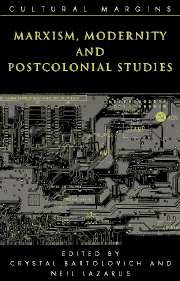Book contents
- Frontmatter
- Contents
- 1 Introduction: Marxism, modernity and postcolonial studies
- Part I Eurocentrism, “the West,” and the world
- 2 The rise of East Asia and the withering away of the interstate system
- 3 The fetish of ‘the West’ in postcolonial theory
- 4 The Eurocentric Marx and Engels and other related myths
- 5 Karl Marx, Eurocentrism, and the 1857 Revolt in British India
- Part II Locating modernity
- Part III Marxism, postcolonial studies, and “theory”
- References
- Index
4 - The Eurocentric Marx and Engels and other related myths
Published online by Cambridge University Press: 22 September 2009
- Frontmatter
- Contents
- 1 Introduction: Marxism, modernity and postcolonial studies
- Part I Eurocentrism, “the West,” and the world
- 2 The rise of East Asia and the withering away of the interstate system
- 3 The fetish of ‘the West’ in postcolonial theory
- 4 The Eurocentric Marx and Engels and other related myths
- 5 Karl Marx, Eurocentrism, and the 1857 Revolt in British India
- Part II Locating modernity
- Part III Marxism, postcolonial studies, and “theory”
- References
- Index
Summary
Europe's failed revolutions of 1848–49 were followed by a decade-long lull in the class struggle. Karl Marx and Frederick Engels, like others who had been brought into active politics during those two momentous years, were always on the look out for new revolutionary initiatives – a posture that could sometimes lead to wishful thinking. When developments in Russia at the end of 1858 suggested that the revival might begin there and then spread to Western Europe, Marx, writing from London to his comrade in Manchester, advised caution this time. Given capitalism's still ascendant trajectory in other areas of the world, such a revival might “be crushed in this little corner of the earth” (Marx-Engels 1975a, 40: 347). The fate of the revolutionary process in Western Europe was not only dependent now on developments elsewhere but its own weight in that process had diminished. Contrary, then, to what has come to be a staple in much of the literature, Marx and Engels, at least by 1859, had begun to look beyond the “little corner” in which they lived to the rest of the world for revolutionary initiatives.
This article disputes the charge that Marx and Engels were Eurocentric – a charge that has roots in the long-established marxological enterprise and has since been embraced by postcolonialists and postmodernists to varying degrees – and argues that they were first and foremost revolutionaries who viewed the entire globe as their theater of operations.
- Type
- Chapter
- Information
- Marxism, Modernity and Postcolonial Studies , pp. 65 - 80Publisher: Cambridge University PressPrint publication year: 2002
- 25
- Cited by

